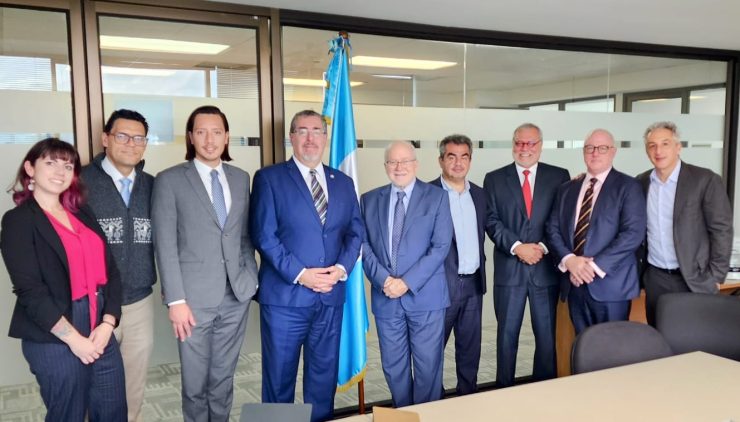Vance Center Leads International Delegation to Guatemala
November 2023The Vance Center led a delegation to Guatemala on November 6-7, 2023, to analyze the current state of the judiciary and rule of law and offer recommendations for the coming months.

The Vance Center delegation met with President-elect Bernardo Arévalo on Nov. 6, 2023, in Guatemala City. Photo: Vance Center
Building on the Vance Center’s years of work in Guatemala, the delegation aimed to analyze the current situation in the country from a legal perspective and offer recommendations to support restoring public confidence in the Guatemalan judicial system, institutionalizing an independent judiciary, aligning with international democratic standards, and strengthening the rule of law.
While in Guatemala, the delegation met with various actors from key sectors, including civil society groups, lawyers, judges, journalists, and media representatives. On November 6, the delegation also met with President-elect Bernardo Arévalo to discuss a peaceful and democratic transition of power, the need for a modern anti-corruption framework, and the importance of an independent, effective, and comprehensive justice system.
Upon concluding its visit, the delegation noted broad concerns about issues of judicial independence, significant restrictions on freedom of expression and the media, including threats of violence against journalists and unjustified arrests and prosecutions of journalists, and serious corruption. It shared some of these concerns in a press release highlighting initial observations and recommendations, including:
- The obligation to respect the will of the Guatemalan people, as reflected in the results of this year’s national elections. Popularly elected representatives must take office as scheduled on January 14, 2024, without further interference or efforts by officials to obstruct the transition of power or functioning of political parties.
- In light of the attacks on electoral results through the political misuse of the Prosecutor General’s Office, the Prosecutor General should resign before the new administration takes office to allow proper restoration of the rule of law. Otherwise, urgent legal measures should be sought to ensure the Prosecutor General’s Office resumes compliance with all its obligations under the law.
- If the transition process fails to take place, or if it is announced or confirmed that it will not occur, it will cause serious harm to Guatemala. This will significantly and unfavorably affect the investment climate and hinder business development in the country, thereby negatively impacting the economic well-being of all Guatemalans. The United States and other countries will immediately impose economic sanctions until democratic order is restored.
- As democratic actors, government officials and state entities must guarantee freedom of the press and freedom of expression, refrain from criminalizing journalistic activities and ensure that journalists and media organizations can work safely.
- The Constitutional Court must assume its role as guardian of the Constitution and the international principles to which Guatemala has committed.
- The Guatemalan legal community, with the support of the international legal community, should undertake all actions necessary to strengthen democracy and the rule of law.
“The rule of law is essential to protect and guarantee individual rights and legal certainty. This moment is a turning point for democracy in Guatemala that will determine the future of the country’s development,” said Hunter T. Carter, partner at ArentFox Schiff and member of the Vance Center Committee, who participated in the delegation.
“After meeting with various national actors, we warned of a serious risk to democracy in Guatemala and a high economic cost to the country if the election results are not respected,” said José Ugaz, Peruvian jurist and former president of Transparency International, also a member of the delegation.
Delegation participants included Carter; Ugaz; Ciro Colombara, a Chilean lawyer and member of the Executive Committee of the Pro Bono Network of the Americas; Vance Center Special Counsel Douglass Cassel; New York-based lawyer Andrew Kaufman; and Vance Center Latin America Policy Director Jaime Chávez Alor and Communications Manager Natalie Southwick.
For more details about the delegation, its findings, and the full set of recommendations, see the published report in English and Spanish.

